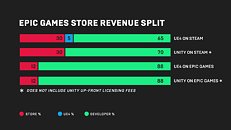- Joined
- Mar 25, 2009
- Messages
- 9,823 (1.69/day)
- Location
- 04578
| System Name | Old reliable |
|---|---|
| Processor | Intel 8700K @ 4.8 GHz |
| Motherboard | MSI Z370 Gaming Pro Carbon AC |
| Cooling | Custom Water |
| Memory | 32 GB Crucial Ballistix 3666 MHz |
| Video Card(s) | MSI RTX 3080 10GB Suprim X |
| Storage | 3x SSDs 2x HDDs |
| Display(s) | ASUS VG27AQL1A x2 2560x1440 8bit IPS |
| Case | Thermaltake Core P3 TG |
| Audio Device(s) | Samson Meteor Mic / Generic 2.1 / KRK KNS 6400 headset |
| Power Supply | Zalman EBT-1000 |
| Mouse | Mionix NAOS 7000 |
| Keyboard | Mionix |
With more and more companies creating their very own digital storefronts in the PC gaming space, it was only a matter of time until Epic Games threw their hat into the ring. With an announcement posted today, by Tim Sweeney the Epic Games store is now officially a reality. The new digital storefront will be made available for PC and Mac to start with, while other platforms will be added throughout 2019. In regards to games available on the platform, Epic will offer Fortnite alongside a set of hand-curated titles at launch. What those games might be is currently unknown.
Delivering a shot across the bow at Steam and their 30% revenue cut, Epic's game store will instead only take 12%, resulting in developers earning 88% of sales revenue. If they are using Unreal Engine the 5% engine royalty will be waived by Epic and instead is factored into their original 12% take. Putting that into perspective, an Unreal Engine based game released on Steam currently gives developers only 65% of the revenue with Steam earning 30% and Epic 5% due to engine royalties. Going from 65% to 88% is a significant increase in earnings, and it doesn't matter what game engine a developer uses, the revenue split will remain the same. This should leave developers quite happy since they are not limited by game engine choice and Epic benefits from a vastly increased selection of titles they can offer in their digital store.


Epic looks to give developers far more freedom with their digital platform as well. Offering access to their 10,000 strong Epic Games Support-A-Creator program that is designed to get a developer's games into the hands of YouTube content creators, Twitch streamers, etc. They even go so far as to cover the first 5% of creator revenue-sharing costs for the first 24 months. Better yet while its an option it is not mandatory, thus giving developers options that best suit their needs without forcing a one-size fits all approach. Developers are also given complete control over their game pages and news feeds, with no other advertisements or marketing of competing titles.
Overall it appears Epic is ready to take a slice of the digital pie and has prepared for some time to do just that. The only real problem will be converting users away from Steam. While EA's Origin platform has had some success, it has also been around for seven years at this point. Meanwhile, Ubisoft has a weird amalgamation of Steam and Uplay, that is somewhat separate from their stand-alone Uplay store which when you consider the issues associated with it, comes off as being a complete mess. Therefore while it seems the Epic Games store is primed for success, it's all about gaining users, and while Fortnite is a phenomenon, it remains to be seen if it will be enough to convert a legion of followers into using the Epic Games store instead of Steam.
View at TechPowerUp Main Site
Delivering a shot across the bow at Steam and their 30% revenue cut, Epic's game store will instead only take 12%, resulting in developers earning 88% of sales revenue. If they are using Unreal Engine the 5% engine royalty will be waived by Epic and instead is factored into their original 12% take. Putting that into perspective, an Unreal Engine based game released on Steam currently gives developers only 65% of the revenue with Steam earning 30% and Epic 5% due to engine royalties. Going from 65% to 88% is a significant increase in earnings, and it doesn't matter what game engine a developer uses, the revenue split will remain the same. This should leave developers quite happy since they are not limited by game engine choice and Epic benefits from a vastly increased selection of titles they can offer in their digital store.


Epic looks to give developers far more freedom with their digital platform as well. Offering access to their 10,000 strong Epic Games Support-A-Creator program that is designed to get a developer's games into the hands of YouTube content creators, Twitch streamers, etc. They even go so far as to cover the first 5% of creator revenue-sharing costs for the first 24 months. Better yet while its an option it is not mandatory, thus giving developers options that best suit their needs without forcing a one-size fits all approach. Developers are also given complete control over their game pages and news feeds, with no other advertisements or marketing of competing titles.
Overall it appears Epic is ready to take a slice of the digital pie and has prepared for some time to do just that. The only real problem will be converting users away from Steam. While EA's Origin platform has had some success, it has also been around for seven years at this point. Meanwhile, Ubisoft has a weird amalgamation of Steam and Uplay, that is somewhat separate from their stand-alone Uplay store which when you consider the issues associated with it, comes off as being a complete mess. Therefore while it seems the Epic Games store is primed for success, it's all about gaining users, and while Fortnite is a phenomenon, it remains to be seen if it will be enough to convert a legion of followers into using the Epic Games store instead of Steam.
View at TechPowerUp Main Site




 That's hillarious.
That's hillarious.